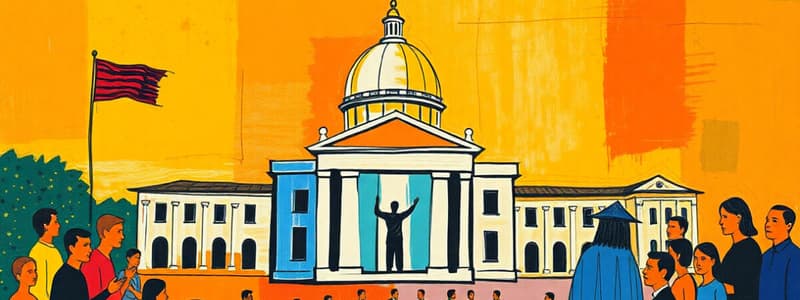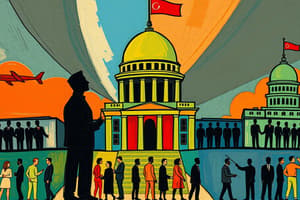Podcast
Questions and Answers
What primary function does a government serve in society?
What primary function does a government serve in society?
- To create wealth for its citizens
- To maintain cultural traditions
- To enforce public policies (correct)
- To promote individual freedoms
Which of the following best describes authoritarianism?
Which of the following best describes authoritarianism?
- A government model focused on popular sovereignty
- A system where rulers are elected by the people
- A government type with dispersed power among various parties
- A system characterized by strong central power and limited freedoms (correct)
What key principle is articulated in the Declaration of Independence?
What key principle is articulated in the Declaration of Independence?
- Supremacy of the monarchy
- The power of the national government
- The right to bear arms
- Natural rights and popular sovereignty (correct)
What was a significant flaw of the Articles of Confederation?
What was a significant flaw of the Articles of Confederation?
What is the main purpose of the separation of powers in the Constitution?
What is the main purpose of the separation of powers in the Constitution?
What defines federalism in the context of the U.S. government?
What defines federalism in the context of the U.S. government?
Which of the following powers belongs exclusively to the state governments?
Which of the following powers belongs exclusively to the state governments?
What is a key characteristic of democracy as defined in the content?
What is a key characteristic of democracy as defined in the content?
What is the main purpose of the Bill of Rights?
What is the main purpose of the Bill of Rights?
Which amendment abolished slavery?
Which amendment abolished slavery?
Which of the following correctly defines civil rights?
Which of the following correctly defines civil rights?
What is the role of the Electoral College in presidential elections?
What is the role of the Electoral College in presidential elections?
What powers does Congress possess?
What powers does Congress possess?
What does judicial review allow the Supreme Court to do?
What does judicial review allow the Supreme Court to do?
Which of the following accurately describes the structure of the United States Congress?
Which of the following accurately describes the structure of the United States Congress?
What are the three tiers of the federal court system?
What are the three tiers of the federal court system?
Flashcards are hidden until you start studying
Study Notes
Introduction to Government
- Governments are institutions responsible for creating and enforcing public policies within society.
- Essential functions of government include providing for national defense, promoting the general welfare, and ensuring justice.
- Three primary types of government: democracies, monarchies, and authoritarian regimes.
Democracy
- Power in democracies rests with the people, exercised directly or indirectly through representation.
- Democratic systems often involve periodic free and fair elections.
Monarchy
- Ruled by a single individual, typically inheriting the position for life.
Authoritarianism
- Characterized by concentrated central power and limited individual freedoms.
Foundations of American Government
- Early American colonies developed self-governing systems that influenced the later development of the United States.
- The Declaration of Independence declared independence from Great Britain, articulating principles of natural rights and popular sovereignty.
- The Articles of Confederation, the first US government, was ultimately replaced by the Constitution due to its weakness.
The Constitution
- Drafted at the Constitutional Convention in 1787.
- Establishes a system of government based on separation of powers, checks and balances, federalism, and limited government.
- Divided into seven articles outlining the structure and powers of the federal government.
Federalism
- A system where governmental power is divided between national and state governments.
- The national government has enumerated powers, including regulating commerce, declaring war, and coining money.
- State governments retain all powers not specifically granted to the national government, referred to as reserved powers.
Civil Liberties
- The Bill of Rights, the first ten amendments to the Constitution, ensures fundamental rights and freedoms for individuals.
- The First Amendment guarantees freedom of religion, encompassing the right to practice any religion or none at all.
- Freedom of speech is also protected by the First Amendment, though with limitations on types of speech like defamation and incitement to violence.
Civil Rights
- These are rights of citizens to political and social freedom and equality.
- The Thirteenth, Fourteenth, and Fifteenth Amendments (passed after the Civil War) abolished slavery, granted citizenship to African Americans, and guaranteed their voting rights.
- The Civil Rights Movement of the 1950s and 1960s fought for equal rights for African Americans and other marginalized groups.
Congress
- The United States Congress is a bicameral legislature with the House of Representatives and the Senate.
- Congress possesses the authority to create laws, declare war, approve treaties, and impeach federal officials.
- A bill must pass through both houses of Congress and be signed by the President to become law.
The Presidency
- The President is the head of state and government, wielding significant power including vetoing legislation, commanding the armed forces, and appointing federal officials.
- The Electoral College, not popular vote, determines the presidential election.
- The Cabinet, composed of heads of executive departments, advises the President.
The Judiciary
- The Supreme Court is the highest court in the US, holding the power of judicial review, allowing it to declare laws unconstitutional.
- The federal court system is structured in three tiers: district courts, courts of appeals, and the Supreme Court.
- Legal distinctions include criminal law, civil law, and constitutional law.
Studying That Suits You
Use AI to generate personalized quizzes and flashcards to suit your learning preferences.





